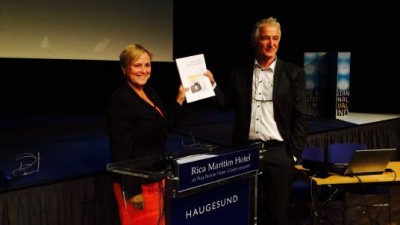Norway is releasing a record number of new state-supported film projects this autumn, but the industry often fails to reel in profits. A new study shows that while Norwegian films have gained market share in local cinemas, three out of four generate losses, and tensions are running high between filmmakers and the government.

The study was handed over to the government minister in charge of cultural issues, Thorhild Widvey of the Conservative Party, at the annual Film Festival in Haugesund this week. The festival, Norway’s largest, has assembled a star-studded lineup of those active in the Norwegian film business, and many have been lashing out at Widvey over what they claim is a lack of clarity and support for their industry from her government administration. They also complain of a lack of “dialogue” with Widvey and her staff, and fear they’re not being heard.
“I’m really scared,” producer Aage Aaberge, behind such major films as Kon-Tiki, told newspaper Dagens Næringsliv (DN). “I’ll be trembling when I look at the next (state) budget, and I have survived 13 ministers of culture.” Director Erik Poppe summed up the situation on Saturday night when his film Tusen ganger god natt won the Amanda Prize, Norway’s equivalent of an Oscar, for best film during the past year: “This film was made based on the former (left-center) government’s culture budget, remember that!” Poppe exclaimed on live TV and with Widvey, who cut this year’s film support by NOK 32.5 million, standing next to him on the stage after she’d handed him the prize. The audience responded with laughter and cheers.
Widvey blasted back at a seminar in Haugesund on Monday, claiming she wasn’t offended by Poppe’s outburst over the weekend and denying that she hasn’t clarified her thoughts on support for the film industry. “Even though there are rumours in the papers that it’s difficult to be heard: You are all welcome to come with ideas and proposals,” she told the audience. She thinks much of the criticism and concern is “unreasonable,” telling DN that “it would be an advantage if (filmmakers) offered constructive proposals instead of what they’re doing: Creating hysteria and criticism.”

The new study of the state of filmmaking in Norway, meanwhile, shows that Norwegian film has nearly doubled its share of all films shown in the country, from 12 percent in 2005 to 23 percent last year. Several Norwegian films have also enjoyed wide public acclaim. Their share of the most-seen films at Norwegian cinemas has increased and there have been some local blockbusters, like Max Manus and Kon-Tiki. But even though ticket sales and ticket prices have increased at Norwegian cinemas, fewer Norwegian films are included among those with box office success.
With a record 15 films being released this fall alone, experts fear that many of them will fail to generate any profits. The consulting firm that produced the study, research firm Ideas2evidence, concluded that the film business in Norway is financially weak. Most films are produced by “economically weak” companies, the firm wrote in its report, that “to an increasing degree” live off the margins of their production activity and not from the income of the films. The report from Ideas2evidence, though, recommends against cutting state support, claiming that such cuts can in turn reduce the possibilities for films to attract private capital investment.
Widvey said she thinks the report will “provide a good basis” for “evaluating” Norwegian film policies. Her critics fear that fewer films will secure state subsidy in the future. The filmmakers aren’t the only ones worried. Professor Anne Gjelsvik at the Norwegian University of Science and Technology (NTNU) in Trondheim, told newspaper Dagsavisen that it’s time for Widvey to come with proposals herself. “Widvey now must start expressing some opinions of her own, and not just say that the private sector has responsibility, too,” Gjelsvik said. “My irritation with the current (conservative) government is that they said they wanted to reduce film support while they conducted an evaluation and stressed quality. But it’s been very quiet since then.”
Also split over incentives
Widvey has also been meeting concerns and resistance, meanwhile, to another proposal from her ministry for Norway to set up an incentive program to lure more foreign filmmakers to Norway. Norway’s scenery can provide some stunning backdrops, but some in the local industry fear an incentive program will come at the cost of current film support programs. They argue that tax incentives generally benefit the business interests behind filmmaking, and not cultural development.
“I know there’s been some debate of this (the proposed incentive program), and I’m surprised over the opposition in some portions of the industry,” Widvey told DN last week. “We’ve been very clear that our agenda is to assist both Norwegian and foreign filmmakers.” On Monday, in front of the film industry players assembled in Haugesund, she added: “Let me be crystal clear: I have no plans to take (money) from Norwegian film production and give it to foreign film production.”
That sort of statement may be what it takes to ease the tensions with the industry she’s charged with supporting. “It was an enormous relief to hear her say that,” producer Silje Hopland Eik of Cinenord told newspaper Aftenposten. Others still worry Widvey, who supports the controversial and expensive effort to mount a Winter Olympics in Oslo in 2022, seems more willing to support and fund sports than film or other cultural endeavours. Widvey refused to offer any insight into her ministry’s state budget proposal for next year, which won’t be released until October.
newsinenglish.no/Nina Berglund

